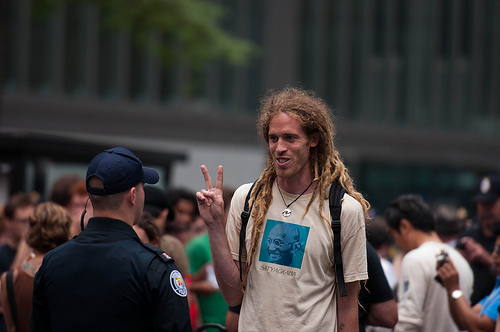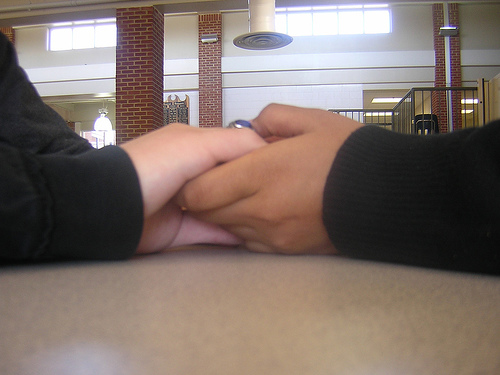Can a Bipolar Person Lead a Normal Life?
I know one of the most common questions when it comes to bipolar disorder is whether people with bipolar disorder can lead a normal life. The question, unfortunately, is one of those loaded ones. It really depends on what one means by “normal”. However, rather than simply throw up my hands and yell “Semantics!”, I thought I’d look at some of the different senses of “normal” and whether or not bipolar people can lead a normal life in those senses.
In my own experience, yes, we can lead a normal life and in the most important sense. While our lives will never be exactly the same as the lives of other people, we can enjoy the same things that other people normally enjoy.
Sense #1: Being The Same as Everyone Else

Source: istolethetv - CC BY 2.0
Incurability and Symptoms
In addition, not only is bipolar disorder incurable, there is also no current treatment that makes people completely asymptomatic. This is actually a common confusion among people who don’t have bipolar disorder. They assume that the correct medication will completely wipe our symptoms away, and make it so that, although we are “technically” bipolar, there would be no way to tell. This simply isn’t the case. Although treatment can often stave off full-blown manic episodes for the rest of some people’s lives, I have never met or heard of any bipolar people who become completely euthymic (i.e. has no episodes of any kind) for the rest of their lives.
Part of our treatment, then, usually involves avoiding what are called triggers. For most of us, it is some kind of stress, but there can be others, such as types of music, competitions, staying up late, seasons and so forth (people can sort of avoid seasons using light therapy). What this means is that people with bipolar disorder are going to need to alter their life in certain ways to avoid those triggers. So, if someone finds that staying up late can trigger an episode, he or she might simply be unable to go to a certain party.
In addition, bipolar people have different levels of functionality. While levels of functionality can be improved through treatment, bipolar disorder will affect the functionality of most people that have the disorder. This means that people with bipolar disorder may have to limit the amount and kind of work that they do. This, of course, can have financial effects, as it can be difficult to find jobs the pay sufficiently but adhere to the kind of structure of which a given bipolar person is capable. In effect, bipolar disorder is a disability, and most of the developed world now recognizes it and treats it as such.
So, our lives will never be exactly the same as other people’s. However…
Sense #2: Having the Things Most People Consider Important
The other sense in which people might be said to have a “normal” life is that we are able to have the things that most people consider important. In other words, do we need to radically alter what it is that we can expect from life because we have bipolar disorder, or are we, at the end of the day, able to have the things that most people want? In this sense, which I think is the more important sense, people with bipolar disorder are able to lead normal lives.The reason that I think this is the more important sense is that I believe it is what people are really asking about when they ask whether or not people can lead a normal life. Let’s just do a comparison. Can someone who has purple feet lead a normal life? In the first sense, no, the person with purple feet cannot lead a normal life, because the person with purple feet is living a life with purple feet, which isn’t normal. However, we don’t care about that because having purple feet is trivial (except for foot models, but I digress). What we do care about is whether or not we can live a life that is normal in an important way – that is, whether or not it affects our ability to be happy.
Happiness
As far as I can tell, there are two things that make people happy: engagement in fulfilling activities and good relationships with other people. Proper management of bipolar disorder allows us to have both of these things.
Fulfilling Activities
When we are even moderately euthymic, we are able to engage in many different types of activities. Often, too much focus is put on the kind of activities for which people are willing to pay us, and the less functional a given bipolar person is, the smaller the range of things that will be. However, there are still a number of other activities in which we can engage that are fulfilling but don’t involve getting paid. One thing that a number of bipolar people I have met do is involve themselves in charitable activities, often in the mental health field itself. Charities are far less picky in terms of schedules and longer-term absences, and put a lot less pressure on their members (not to mention that they rarely threaten to fire you).
Good Relationships

Source: jepoycamboy - CC BY-SA 2.0
Good relationships are hard, regardless of whether people are bipolar, but they are certainly possible. Our special challenge is that we tend to construct “emotional narratives” out of our current emotional state and project them onto other people (actually, everyone tends to do this, but because our emotions are so extreme, our narratives tend to be more extreme, too). However, one of the advantages of bipolar disorder is that, over time and with treatment, we tend to see our emotions as less, well, real. The insight that comes from this allows us to overcome one of the strongest barriers to having good relationships with other people: seeing them as extensions of our own emotions.
Relationships can certainly be a lot more work for people with bipolar disorder, but I am often struck by how close bipolar people are with some of their friends and some of their family members. They draw real fulfilment from those relationships, and people are often amazingly supportive through some of the tougher episodes that bipolar people have.
Conclusion
In the most important sense, then, yes, bipolar people are capable of living a normal life. This doesn’t mean that their lives will be the same as other people’s. However, with treatment to overcome the worst of the episodes, bipolar people can engage in fulfilling activities and have meaningful relationships. Since that’s what we want out of a normal life, anyway, it is possible for us to have one.










Hey Daniel,
Once again a great post.
I always ask what “normal” means:) There are a lot of pressures society puts on people re how their life is supposed to be and what they’re supposed to accomplish, etc. I find in my work that people with mental illnesses often feel like they are failures because they don’t always meet societal standards around work and other expectations. Who is anyone to judge what “normal” is? With good coping strategies and other interventions including medications, a person with bipolar disorder can lead a very meaningful life.
As you stated, meaningful relathionships, connections and fulfilling activities are so important in a person’s life. Love and support is what it’s all about.
Andrea
Thank you, Andrea.
Yes, I’ve found that social expectations of what constitutes success can be one of the biggest difficulties for me. Of course, all the added pressure I’ve put on my self doesn’t help either ;).
Best,
Daniel
Hi Daniel,
Great post – I enjoyed reading. Totally agree with you on the points you made. These days, with so much physical and mental illness, around the place I am almost inclined to say that disability is becoming the norm. Perhaps not lifelong disability, but it seems to me that many people will be disabled in some form or another at some point during their lifetime.
I think it’s so important for everyone, especially those with chronic disorders like Bipolar, to examine their values and what is important to them in their life. I find that living my life by my values brings great happiness, satisfaction and fulfillment to me. I feel a huge sense of accomplishment by doing things that are meaningful to me.
Regards,
Sara
Hello. This came through on Twitter and I decided to check it out. Nice work! I think you hit the nail on the head when you use the term meaningful. Yes, I believe most of us suffering from debilitating mental illnesses can lead meaningful lives. I’m not saying it’s easy. A “normal” life is probably not worth us trying to achieve anyway. — Jeff
Hi, I am Bipolar 1 with Psychotic Ideation and registered as legally insane with the Santa Clara County police department. I was diagnosed in 1997 by a good Jewish Pdoctor in that County. It is impossible to hide the stigma of my type of bipolarity so much so that I am forced to showcase it as a tool to educate the public about the real dangers of bipolar 1 and to stop trying to stop the stigma. I am the stigma, and I can not live a normal life because of it. Bipolar 2 people on meds can live a normal life but on my meds I am still volatile and say things that sound off the wall to others but makes perfect sense to me.
There are definitely marked differences in the degrees of severity with bipolarity between the bipolar 1’s and the bipolar 2’s. I have a hard time getting other bipolar’ to listen to me and my type of bipolar and I have been deleted from bipolar groups for talking about it and trying to get some attention around just how serious it really is. I scar bipolar 2’s away. They don’t want to hear that there is a bipolar out there bad enough to be registered as legally insane. It is only during a manic episode that I am really out of it and scary and the rest of the time I seem normal even though i’m not.
Hi Angel,
Thank you for sharing your experiences. My hope in this post was to show how, by focusing on happiness rather than being like everyone else, we can have happier lives. The kind of episodes that people with bipolar I have is especially problematic, and cause a special type of stigma, as you say. It can often be difficult for people to appreciate what other people are going through. In my experience, any type of mental illness helps alleviate this, as suffering makes us more open to the experiences of others.
Thank you for the article Daniel,
I would like to add that in addition to engagement in meaningful activities and forming meaningful relationships with people that time for solitude and reflection are also important for a contented life.
Quality of sleep is so important for the health of bipolar people as we know. In my experience time to just be quiet, alone and with the opportunity to without stress, dream while awake, allows us to be as we naturally are.
Best wishes, Andrea
Thank you for your comment, Andrea. I also find that sleep is a very important part of recovery, as well as destressing one’s life. Thank you for the suggestions.
Best,
Daniel
Thanks for the great insight Daniel. I have Bi-polar 1 I was diagnosed three years ago at age 42. I have 23 years in working for the State, and I was fortunate to get Social Security Disability and my State Pension approved based on disability. The issue isn’t money it’s my self worth. At times I feel like it just eats me alive. I want to volunteer but for some reason I haven’t in the year since I left work. I’m not severly depressed and my last manic attack was last may and june (and my psych switched me from periphenizine to lithium 1500mg with 300mg wellbutrin and 30mg prozac. So I’m not sure if it’s depression, fear, or lack of motivation. I don’t mean to ramble, but I feel better expressing my thoughts to a group who understand and has ‘been there’. Thanks for keeping up your great page you probably don’t realize how much you’re helping people doing so.
You’re welcome, Paul :). I’m very happy to hear that this page has been so helpful.
@ Angel,I am diagnosed as Bipolar 1 with GAD,I have been sectioned 9 times & have had 4-5 other manic episodes where I was able to manage the mania with tranquillizers & so thus avoid hospitalisation.
I take St Johns Wort(a high dose) & 3 grams of Omega 3 fish oils,these are the only medications that I take regularly on a daily basis,I use tranquillizers as & when necessary to manage any sleep disturbances & very,very occasionally to render myself unconscious when the Bipolar rage kicks in properly,this tends to be when the anxiety is also very bad.
I have very poor reactions to antideppressant medications,they tend to make me manic,& so my consultant psychiatrist & I have decided that they are not appropriate for use in my case,hence the prescription for St Johns Wort.
I am very lucky in that I have good insight into this disorder(according to the psychologists that I have seen,I am regarded as having a well balanced personality But with a severe biochemical imbalance)& I have managed to come up with coping stratagem’s to deal with this disorder.
I have found that the hardest part of managing this disorder is.What I call being my own emotional policeman,by this I mean,I know that I suffer from a mood disorder,that can cause me to feel emotions that are unwarranted & are not appropriate,so I have to be monitoring myself to ensure that my responses to other people & events are appropriate,this takes a long time to master,& is only possible due to the good friends that I have,I have a number of people whom I am able to reflect to about my behaviour,if I have been out of order,or even if someone has said I’ve been out of order,I don’t always agree with what I’m told,but I endeavor to think about what I’m told & then go & make amends(if that is necessary)
I don’t automatically think that my viewpoint is correct,as I hold the thought that my emotions are often not to be trusted.I am generally able to tell when I’m feeling out of sorts & will say to my mates,that I’m not feeling well & they will have to expect some odd moments,but not to take them to heart.
But I’m living a normalish existence,with this disorder & I feel that you could too.
I control this mood disorder with diet,exercise,acupuncture,aromatherapy & cognitive programming/NLP.
I’d recommend reading Leslie & Susanah Kentons “Raw Energy” & “Juice High” Patrick Holford’s “Optimal Nutrition for the mind” David Burns “The feeling good handbook” Valerie Ann Worwood’s “The Fragrant mind” & I’d also recommend acupuncture too.
I also recommend exercise,but it has to something that you find fun,I can’t stress that it has to be FUN enough,as I have found that FUN is the ideal dart to puncture despair,I ride a unicycle as transport in East London,where I live,& I play unicycle hockey & badminton.
I hope that this helps you in some way,as your post seemed to have little optimism in it.
If I can come through the many sectioning’s(forced hospitalisation) to the place I’m now in,a high functioning NUTTER,who is dealing with Bipolar 1 & GAD & is happy some of the time,aiming for most of the time,so can you,keep your chin up.
Luv 1Wheel.